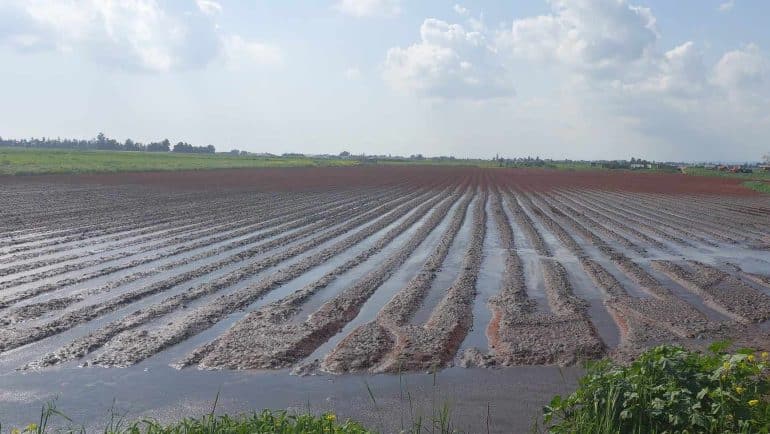The competent Authorities of the Ministry of Agriculture, Rural Development and Environment (Department of Environment, Department of Agriculture and Department of Water Development) yesterday investigated the pollution incident in the Achnas dam area, in cooperation with the President of the Achnas Community Council, Mr. Nikos Vasilas, after related complaint made on Sunday, 25/2/2024.
The complaint related to a liquid livestock waste evaporation tank failure which resulted in large quantities of waste spilling onto adjacent agricultural crops and ending up at the Achna Dam.
During the on-site investigation, the competent authorities found the following:
• Failure of liquid livestock waste evaporation tank and spillage of an estimated 50.000 cubic meters of waste. It is noted that the Operator of the Livestock Unit (Cattle Unit) is the holder of a valid Waste Disposal Permit, which, among other things, includes the possibility of disposing the liquid livestock waste of the Unit in question in suitable evaporation tanks.
• The failure of the evaporation tank (caving in of the external walls about 5 meters wide) is prima facie estimated to be due to a problem of its staticity.
• The liquid livestock waste was initially spread to adjacent agricultural plots, with the result that agricultural crops (mainly grain and potato crops) were affected in an area of approximately 2 square kilometers.
• The liquid livestock waste then, and after traveling a distance of about 2 kilometers, ended up at the Achnas dam.
In view of the above, the following actions were taken or initiated:
• Immediate restoration of the failure of the tank by the Operator of the Livestock Unit, resulting in the termination of the leak. It is noted that the tank in question is being monitored so that in the event of a new failure, immediate measures to restore it will be taken.
• Registration in the first phase, by the Department of Agriculture, of all agricultural parcels and their crops that were affected by livestock waste. Subsequently, the detailed assessment of the relevant impacts is planned, as well as the taking of countermeasures.
• Sampling of water from the Achna dam and its immediate analysis by the Water Development Department, in order to establish the level of possible pollution. Subsequently, it is planned to monitor, through sampling, the quality of the groundwater in the affected area to determine any deterioration. Appropriate measures will be taken based on the results of the chemical analyses.
• Immediate implementation and enforcement by the Environment Department of the current legislation regarding the "polluter pays" principle.
• Coordination, continuous monitoring of the issue and taking the appropriate measures in cooperation with all the agencies involved.
